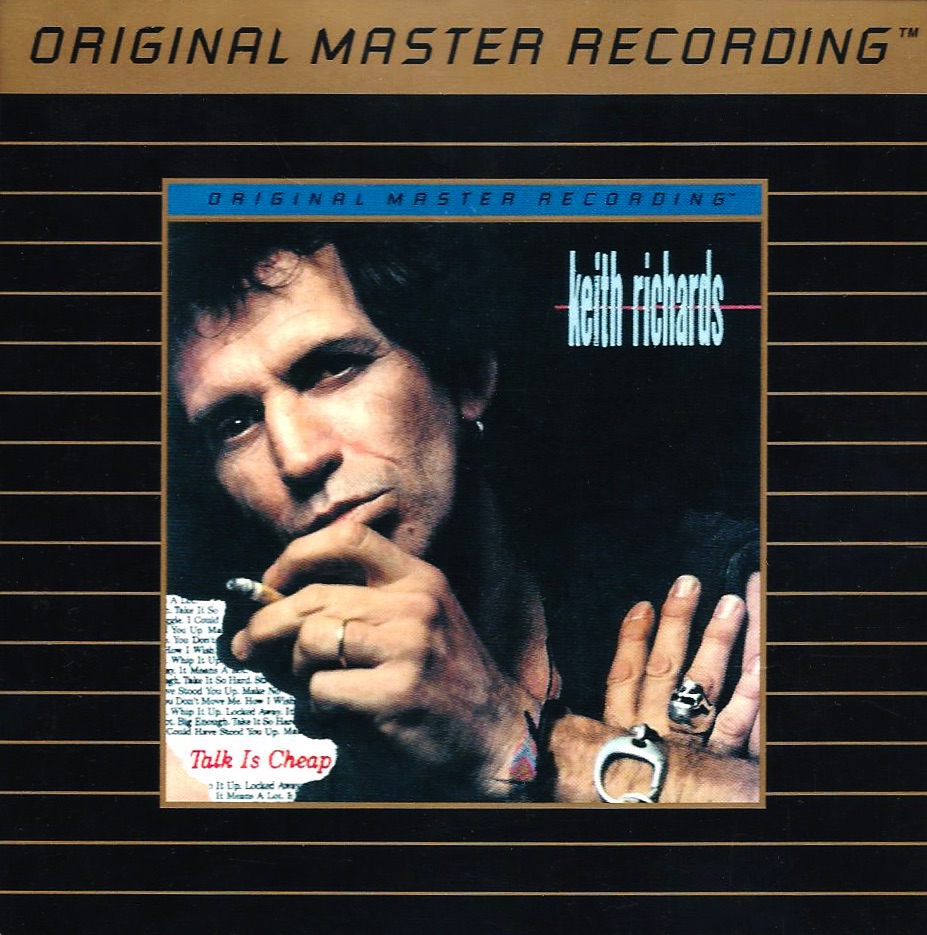
Talk Is Cheap is the debut solo album by Keith Richards, of the Rolling Stones, released in 1988. It appeared a few years into a falling out with bandmate Mick Jagger. It's probably fair to say that had the two rockers not been on the outs this record may never have seen the light of day. But they were on the outs, and the only communication between them seemed to be via sharp-ended barbs in the press. Or - in song, which happens here in a few places. The fighting seems to have been centred around Jagger - who was ever conscious about current trends and fashions - wanting to take the Stones in a direction that reflected the pop sounds of the day, whereas Richards wanted the Stones to remain true to their blues roots. And then there was Jagger's itching to press on with his solo career …
In 1986 the Stones released the mostly forgettable album Dirty Work, and while Richards wanted to get behind the record and tour in support of it ,Jagger was more interested in pursuing the solo course he'd first stepped onto a few years earlier with She's The Boss, a incredibly crappy record that somehow saw enough success to stroke the singer's ego to the point where he wanted to keep the spotlight focused on himself. So with nothing else to do, Richards began recording his first solo project, teaming up with drummer and producer Steve Jordan, who had worked on Dirty Work as a session player. The pair wrote several new songs and one of them, Almost Hear You Sigh, would later find a place on the future Stones LP Steel Wheels.
Recording of Talk Is Cheap began in August 1987 at Le Studio in Morin Heights, Quebec, near Montreal, and continued sporadically until the following May and included sessions in Montserrat and Bermuda.
Richards named his new band X-Pensive Winos, which consisted of Waddy Wachtel, Ivan Neville, Charley Drayton and Steve Jordan. This exceptional collection of talent was augmented by special guest appearances ranging from the funky Bootsy Collins to Sarah Dash, the Memphis Horns, Maceo Parker and future Springsteen-better-half Patti Scialfa. Interestingly, Mick Taylor - a former Rolling Stone himself - also showed up and contributed a lick or two.
Richards never wanted to make a solo record. He'd stated he was a Rolling Stone through and through and that the band would have to break up in order for him to seriously consider such a move. But that's exactly the point the band was at in 1988. They were teetering on breakup's edge and it wasn't looking good. So Richards, with no future Stones plans under consideration, decided to keep himself busy and entered the studio with the Winos, telling Rolling Stone magazine it felt "kind of strange because it was never in the cards for me. It was not something I wanted to do. Also, in the back of my mind, doing a solo record meant a slight sense of failure. The only reason I would do a solo album was because I couldn’t keep the Stones together."
The Rolling Stones endured an onslaught of bad reviews following the release of Dirty Work. They were also grieving the loss of longtime pianist and fifth Stone, Ian Stewart, who often smoothed things over between Jagger and Richards.
To Richards' surprise, once he commenced work on Talk Is Cheap the floodgates opened and an entire record's worth of really good new songs poured out.
The first single to be released was Take It So Hard, a gritty rocker that was truer to the sound Richards loved than anything on Dirty Work (except for maybe Too Rude, a reggae-influenced tune that for some reason reminds me of Peter Tosh). Another song, You Don't Move Me, was a torpedo launched in Jagger's direction that hit its mark hard. Everyone saw through it, and as a result it garnered the most press. It also infuriated Jagger and worsened the tension between the two Stones. Richard recalled the song in an interview with the Washington Post in 1988. "Half of me's saying I don't want to rub the guy's nose in it, but of course you're also human so you stick the knife in and turn it one time."
Talk Is Cheap could not have been further away Jagger's solo work, which seemed laughable in comparison. Much of Talk Is Cheap was cut in 10 days, something that was possible because of the musical chemistry shared by the musicians involved. One of the reasons it sounded so fresh and vibrant was because Richards literally started from scratch, ditching any leftover Stones scraps he had hanging around and might have been tempted to use. All the songs came from working with Jordan and the Winos, and it put Richards in a bit of a conundrum over his loyalty to the Stones. "That was the biggest fear I had at that time," Richards said, in a talk with Tulsa World. "If I write a song do I keep it for myself or give it to the band? That was the biggest stumbling block."
Richards has stated that making this record brought him back to life. It invigorated and challenged him and the resulting newfound energy achieved unexpected results. Take It So Hard, for example, was nailed in a single take. Richards asked for a second go at it, but Waddy Wachtel says he always believed that to be just a formality. "It's just ridiculously good," the guitarist said about that first take in Richard's autobiography, Life. "It was the second tune of the night, and it was this killer fucking take on our strongest tune. I went back to the house going, 'We've conquered Everest already?"
Talk Is Cheap went gold not long after its release and proved there was still an audience for what the Rolling Stones should sound like. To my ears, this would be - if it were a Stones album - one of their very best.
It can be argued that this record led to the band's reunion for 1989's Steel Wheels. Almost Hear You Sigh, a Talk Is Cheap reject, found a spot on that album and eventually became a Top 40 U.K. hit. For a record that Richards says at first almost broke his heart to make, Talk Is Cheap in the end made him, and the rest of the Rolling Stones, better Rolling Stones. It refocused them, and they would reconvene and embark on a new path that would be more successful than anything they had achieved to date - which is saying something!
Richards said the experience of making Talk s Cheap left him with "more confidence in myself. I found that I can, if I have to, live without the Rolling Stones. And that my only job wasn't desperately trying to keep a band together that maybe needed a break."
Unpretentious and honest to the core, Talk Is Cheap is a rock and roll master stroke. The version I have is the Mobile Fidelity gold CD, released in 1992. It's a great-sounding CD, although I'm not sure why I don't have an original vinyl pressing. I'll have to correct that, and then maybe do a shootout. That might be fun!
The album has recently been reissued as a deluxe edition, including a very limited - and expensive - edition signed by Keith Richards.
This disc is …
Talk Is Cheap is the debut solo album by Keith Richards, of the Rolling Stones, released in 1988. It appeared a few years into a falling out with bandmate Mick Jagger. It's probably fair to say that had the two rockers not been on the outs this record may never have seen the light of day. But they were on the outs, and the only communication between them seemed to be via sharp-ended barbs in the press. Or - in song, which happens here in a few places. The fighting seems to have been centred around Jagger - who was ever conscious about current trends and fashions - wanting to take the Stones in a direction that reflected the pop sounds of the day, whereas Richards wanted the Stones to remain true to their blues roots. And then there was Jagger's itching to press on with his solo career …
In 1986 the Stones released the mostly forgettable album Dirty Work, and while Richards wanted to get behind the record and tour in support of it ,Jagger was more interested in pursuing the solo course he'd first stepped onto a few years earlier with She's The Boss, a incredibly crappy record that somehow saw enough success to stroke the singer's ego to the point where he wanted to keep the spotlight focused on himself. So with nothing else to do, Richards began recording his first solo project, teaming up with drummer and producer Steve Jordan, who had worked on Dirty Work as a session player. The pair wrote several new songs and one of them, Almost Hear You Sigh, would later find a place on the future Stones LP Steel Wheels.
Recording of Talk Is Cheap began in August 1987 at Le Studio in Morin Heights, Quebec, near Montreal, and continued sporadically until the following May and included sessions in Montserrat and Bermuda.
Richards named his new band X-Pensive Winos, which consisted of Waddy Wachtel, Ivan Neville, Charley Drayton and Steve Jordan. This exceptional collection of talent was augmented by special guest appearances ranging from the funky Bootsy Collins to Sarah Dash, the Memphis Horns, Maceo Parker and future Springsteen-better-half Patti Scialfa. Interestingly, Mick Taylor - a former Rolling Stone himself - also showed up and contributed a lick or two.
Richards never wanted to make a solo record. He'd stated he was a Rolling Stone through and through and that the band would have to break up in order for him to seriously consider such a move. But that's exactly the point the band was at in 1988. They were teetering on breakup's edge and it wasn't looking good. So Richards, with no future Stones plans under consideration, decided to keep himself busy and entered the studio with the Winos, telling Rolling Stone magazine it felt "kind of strange because it was never in the cards for me. It was not something I wanted to do. Also, in the back of my mind, doing a solo record meant a slight sense of failure. The only reason I would do a solo album was because I couldn’t keep the Stones together."
The Rolling Stones endured an onslaught of bad reviews following the release of Dirty Work. They were also grieving the loss of longtime pianist and fifth Stone, Ian Stewart, who often smoothed things over between Jagger and Richards.
To Richards' surprise, once he commenced work on Talk Is Cheap the floodgates opened and an entire record's worth of really good new songs poured out.
The first single to be released was Take It So Hard, a gritty rocker that was truer to the sound Richards loved than anything on Dirty Work (except for maybe Too Rude, a reggae-influenced tune that for some reason reminds me of Peter Tosh). Another song, You Don't Move Me, was a torpedo launched in Jagger's direction that hit its mark hard. Everyone saw through it, and as a result it garnered the most press. It also infuriated Jagger and worsened the tension between the two Stones. Richard recalled the song in an interview with the Washington Post in 1988. "Half of me's saying I don't want to rub the guy's nose in it, but of course you're also human so you stick the knife in and turn it one time."
Talk Is Cheap could not have been further away Jagger's solo work, which seemed laughable in comparison. Much of Talk Is Cheap was cut in 10 days, something that was possible because of the musical chemistry shared by the musicians involved. One of the reasons it sounded so fresh and vibrant was because Richards literally started from scratch, ditching any leftover Stones scraps he had hanging around and might have been tempted to use. All the songs came from working with Jordan and the Winos, and it put Richards in a bit of a conundrum over his loyalty to the Stones. "That was the biggest fear I had at that time," Richards said, in a talk with Tulsa World. "If I write a song do I keep it for myself or give it to the band? That was the biggest stumbling block."
Richards has stated that making this record brought him back to life. It invigorated and challenged him and the resulting newfound energy achieved unexpected results. Take It So Hard, for example, was nailed in a single take. Richards asked for a second go at it, but Waddy Wachtel says he always believed that to be just a formality. "It's just ridiculously good," the guitarist said about that first take in Richard's autobiography, Life. "It was the second tune of the night, and it was this killer fucking take on our strongest tune. I went back to the house going, 'We've conquered Everest already?"
Talk Is Cheap went gold not long after its release and proved there was still an audience for what the Rolling Stones should sound like. To my ears, this would be - if it were a Stones album - one of their very best.
It can be argued that this record led to the band's reunion for 1989's Steel Wheels. Almost Hear You Sigh, a Talk Is Cheap reject, found a spot on that album and eventually became a Top 40 U.K. hit. For a record that Richards says at first almost broke his heart to make, Talk Is Cheap in the end made him, and the rest of the Rolling Stones, better Rolling Stones. It refocused them, and they would reconvene and embark on a new path that would be more successful than anything they had achieved to date - which is saying something!
Richards said the experience of making Talk s Cheap left him with "more confidence in myself. I found that I can, if I have to, live without the Rolling Stones. And that my only job wasn't desperately trying to keep a band together that maybe needed a break."
Unpretentious and honest to the core, Talk Is Cheap is a rock and roll master stroke. The version I have is the Mobile Fidelity gold CD, released in 1992. It's a great-sounding CD, although I'm not sure why I don't have an original vinyl pressing. I'll have to correct that, and then maybe do a shootout. That might be fun!
The album has recently been reissued as a deluxe edition, including a very limited - and expensive - edition signed by Keith Richards.
This disc is …



